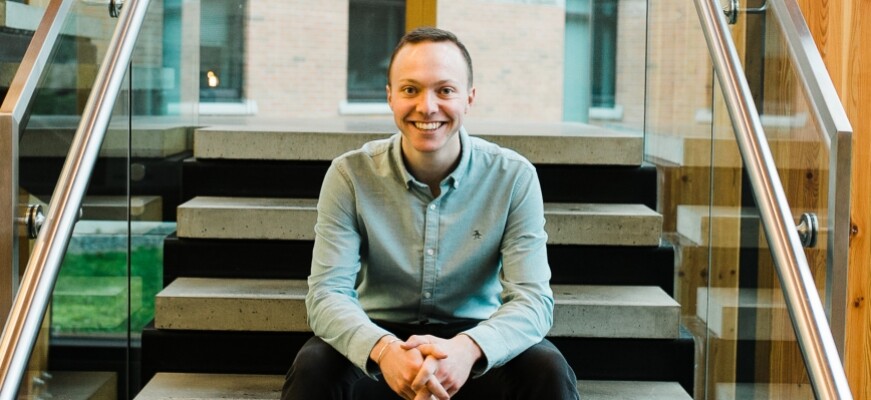

“In theory, with knowledge of microRNA, you could take a finger prick blood sample and accurately determine certain types of cancer.”
— Garth Lester (BSc Biology, 2020)
MicroRNAs play important roles in regulating gene expression, through directing what proteins each cell makes. Since their recent discovery in the 90s, microRNAs have transformed the field of molecular biology.
“We only discovered them a couple decades ago,” says Garth Lester, “We’re really still trying to understand how to tackle them, and what each one does.”
Lester is investigating how exercise affects the heart and impacts health, through comparing people who have inactive lifestyles to regularly active to athletes. He graduated from TWU this past spring with a degree in Biology. He is now working as a researcher alongside Dr. Anita Coté, Assistant Professor in the School of Human Kinetics at Trinity Western University.
Lester is the recipient of a Natural Sciences and Engineering Research Council of Canada – Undergraduate Student Research Award.
Discovering the role of microRNAs in body-wide changes
Scientists are eager to discover how microRNAs are responsible for body-wide changes, as there is still much to learn.
Lester is investigating what happens to the levels of specific microRNAs in the bloodstream when a person exercises. “Our hope is to gather people who aren’t necessarily active, put them through a training program for several weeks, and then during the before and after, we would check to see the levels of specific microRNAs,” he says.
By connecting bodily changes to the specific microRNAs that correspond to those changes, Lester and other researchers hope to gain a fuller understanding of how microRNAs impact exercise-induced developments in the body.
Through methods such as echocardiography, which is an ultrasound of the heart, researchers can measure the changes in a person’s heart following athletic training, and match physiological changes with alterations in the levels of heart-specific mircroRNAs.


Garth Lester presents his research findings at TWU.
Predicting cancer and other diseases
Knowing how microRNAs work could potentially help scientists and doctors predict or diagnose diseases such as cancer.
Lester says, “In theory, with knowledge of microRNA, you could take a finger prick blood sample and accurately determine certain types of cancer.”
Studying the impact of exercise on heart health
Dr. Coté is a cardiovascular physiologist, and she researches how exercise affects the development of the heart and arteries. She was named Canada Research Chair in Cardiovascular Adaptation to Exercise in 2018.
Lester has been involved in several of Dr. Coté’s projects, including ones tracking how exercise affects the heart. He has found that athletes have measurably greater arterial compliance.
Arterial compliance refers to the elasticity of large arteries such as the thoracic aorta, which is responsible for supplying oxygenated blood to the body’s organs. Greater compliance allows the heart to more effectively transport blood throughout the body.
Lester observed higher arterial stiffness among inactive people compared to those with regular lifestyles and those with athletic lifestyles.
He also observed that athletes have higher heart rate variability, meaning that their heart rates adjust more quickly in response to stress. Athletes include people who perform training at least five times per week. Baroreceptor sensitivity, a measure of how sensitive the heart is to changes in blood pressure, was also observed to be highest among athletes.


Dr. Anita Cote conducts research on athletes, with the help of TWU student researchers.
How exercise affects life expectancy
Both arterial compliance and baroreceptor sensitivity are risk factors for cardiovascular disease. Together, Lester’s observations suggest that a person’s life expectancy can be decreased just by the fact that he or she inactive.
“Often when we talk about people’s health, we think that you’re healthy unless you have a disease,” but even just being inactive actually is a risk factor for all-cause mortality,” Lester says.
Lester has also spent his summer conducting a literature review, analyzing data from past research, and writing an academic paper on arterial compliance.
“I’m working on a systematic review on what would happen to a person’s heart if they stopped training, [investigating] what de-training does to actual heart structure,” he says. Lester surmises that heart structure diminishes with de-training, but he is looking to discover how much and how fast decrease would occur.
Working as a researcher during COVID-19
Earlier in the year, Lester nearly lost the opportunity to pursue research this summer, as laboratories shut down due to COVID-19. As a student, Lester himself was forced to return early to his hometown in Smithers, BC, where he conducted his summer research.
Lester remains thankful. “I am very grateful that I was able to do research from a distance. It’s incredible to get the opportunity to do research during my undergraduate studies,” he says.
He credits the low student-to-faculty ratio at TWU for making research opportunities more accessible to undergraduate students.
Lester, who ventured into the field of Human Kinetics as a Biology major, managed to teach himself a brand new academic subject within a matter of weeks, in order to pursue this research opportunity. He has also helped to develop new COVID-19 protocols for laboratory research at TWU.
The rewards of being a researcher
Lester shares his joy, amidst all the challenges of COVID-19:
“It’s really rewarding. I am very grateful. Despite the pandemic, despite missing my grad ceremony, I could at least get this good work experience,” he says.
“I definitely encourage Biology students to do research, if they can, during their undergrad. Definitely worthwhile.”
As a new graduate, Lester intends to remain in the sciences, although he hopes to venture beyond the laboratory. “I like being around people too much to be in a lab all the time,” he says. Lester’s future goal is to pursue a Master’s degree in his field.







































